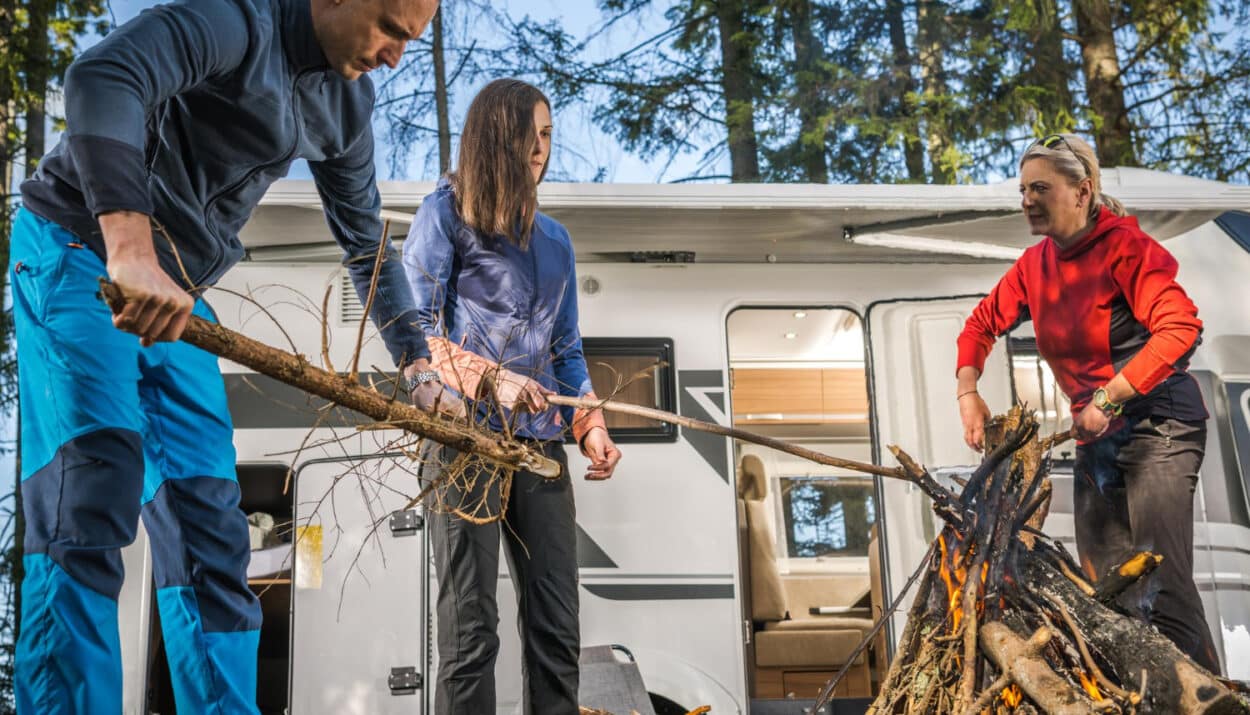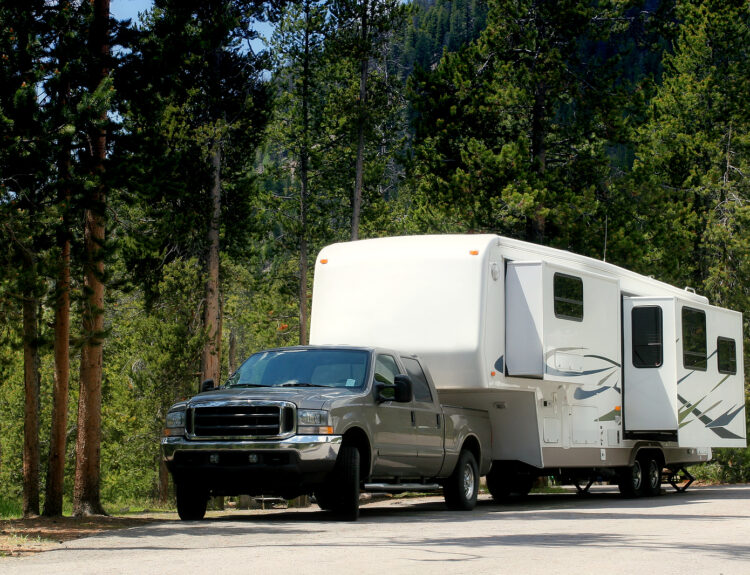RV travel and camping are more popular than ever. This surge means a growing demand for new RV parks and campgrounds. For entrepreneurs, landowners, and investors, building an RV park in the U.S. is a promising opportunity to tap into this booming market.
However, turning an empty plot of land into a thriving campground requires careful planning and a clear understanding of the cost to build an RV park. Building an RV park is a major project with many moving parts. Underestimating the full scope of costs can lead to budget overruns or stalled projects, so it’s crucial to go in with eyes wide open. Below, we break down all the key expenses — from buying land and laying infrastructure to adding amenities and managing ongoing operations. By understanding these cost factors, you can plan a realistic budget and improve your chances of success in the campground business.
Key Takeaways:
- Expect to invest between $15,000 and $50,000 per RV site.
- Land costs vary widely, from $1,000 to $100,000+ per acre.
- Utility setup is one of the largest expenses in RV park development.
- Permits, zoning, and environmental reviews can significantly affect timelines and costs.
- Planning for amenities like Wi-Fi, laundry, and restrooms can boost revenue but raise build costs.

Why Understanding the Cost to Build an RV Park is Important
Entering the RV park business requires significant upfront investment. Knowing the cost to build an RV park is important for several reasons. First, it helps you determine if the venture is financially feasible and if you need financing. A clear budget prevents unpleasant surprises halfway through construction. It also guides your business plan when seeking loans or investors, as lenders will expect detailed cost estimates. Furthermore, understanding costs lets you make informed decisions about park size, location, and amenities based on what you can afford and what will provide a return on investment.
Importantly, grasping the full cost picture can influence your design and marketing strategy. For example, if you know permits and utility hookups will eat a large chunk of the budget, you might prioritize a slightly smaller park or phase construction to manage cash flow. Ultimately, thoroughly understanding all costs up front sets you up to build an RV park that is both high-quality and financially sustainable, helping you avoid costly mistakes.
Land Acquisition Costs
Your choice of land will determine not just your upfront costs, but the long-term success and scalability of your RV park. The ideal parcel isn’t just about price per acre—it’s about usability, accessibility, visibility, and zoning.
How Much Land Do You Need for an RV Park?
You can start small, but most experts recommend having at least 5–10 acres to make room for 10–20 RV sites. That allows space for driveways, pads, utility easements, and community areas.
For larger parks or ones with premium amenities, 15–30 acres is ideal. This allows for pull-through sites, hiking trails, and open spaces that guests love. The extra space pays off in better guest experience and future expansion.
Each site requires roughly 2,000–3,000 square feet. But it’s not just about space per pad—you need access routes, common areas, and buffer zones between units to keep things quiet and comfortable.
Factors That Affect Land Pricing
Land cost varies drastically depending on geography and proximity to tourism hotspots. Rural areas might run $1,500–$6,000 per acre, while land near national parks can reach $75,000 per acre or more.
Urban-adjacent or coastal zones are often the most expensive, with some lots in California or Florida topping $200,000 per acre. At these prices, you must be strategic about revenue potential.
Other price factors include zoning classification, road access, and whether utilities already exist. Unzoned land may seem cheap, but rezoning and infrastructure can balloon the budget fast.
Infrastructure and Site Development
Once the land is purchased, it must be prepared for guests—this is where your vision becomes reality. Site development is about more than building RV pads; it’s about shaping the guest experience and laying the groundwork for future expansion.
Grading, Roads, and Drainage
Before RV owners build, the land must be cleared and leveled. Grading helps prevent erosion and flooding, especially in areas with seasonal rains. Expect $1,500–$5,000 per acre, with costs rising on sloped or wooded terrain.
Road construction is another major budget line. Gravel roads are cheaper, costing $5–$15 per linear foot, while asphalt roads can run $20–$40 per foot. For 1,000 linear feet, that’s $15,000–$40,000 alone.
Drainage systems like culverts or retention ponds may be legally required depending on your site. These systems can range from $10,000 to $50,000 and help protect your roads and guest access year-round.
Cost of Building RV Pads and Hookups
RV pads serve as each guest’s home base, so build them right. Gravel pads are cost-effective, while concrete or asphalt is more durable. Per site, you’ll spend about $1,000–$3,000 just on the pad itself.
Hookups include electrical pedestals, water access, and sewer lines. For 30/50 AMP service, water, and septic per site, expect to pay $10,000–$20,000 more depending on your layout.
Extras like picnic tables, fire rings, or privacy fencing can enhance your appeal and rates. But even without add-ons, you’re looking at $15,000–$30,000 per site once everything is factored in.
Utility Installation Costs
Utilities are not optional—they’re essential. Modern campers expect full hookups, fast internet, and reliable water pressure. Meeting these expectations isn’t as simple as plugging into a nearby line.
Power Lines and Electrical Panels
Electrical needs can sneak up on new developers. Trenching alone can cost $10–$30 per foot, especially if you’re far from the main grid. Multiply that by hundreds of feet and it adds up quickly.
Each RV site typically needs a pedestal, which ranges from $1,500–$3,000 depending on amperage and materials. Add in transformers or larger electrical panels and you could spend $10,000–$50,000 in upgrades.
Installing the wrong equipment or underestimating power load can result in costly redos. Work with a licensed electrician familiar with RV park builds to get it right from the start.
Water Systems and Septic Tanks
If city water isn’t available, drilling a well is your next option. Costs range from $10,000–$30,000 depending on depth, geology, and treatment needs. Add storage tanks and pumps, and costs increase further.
Septic systems are expensive but essential. For small parks, a system might cost $25,000; for larger sites, expect to spend up to $100,000, especially in areas with clay soil or environmental oversight.
Permits and inspections are mandatory, often costing $1,000–$5,000. If your site fails inspection, redesign and resubmission fees can push budgets even higher.
Internet and Wi-Fi Setup
Good Wi-Fi is no longer optional—many campers check online reviews for internet quality before booking. DSL or satellite might work in rural areas, but fiber is preferred if available.
Initial setup for fiber can cost $3,000–$10,000 depending on trenching and provider fees. Then you’ll need a mesh network with routers and boosters, which can add $5,000–$20,000.
Monthly service costs run $200–$1,000, but poor service will cost you more in guest complaints. Investing in a reliable connection boosts reviews, bookings, and retention.

Permitting, Legal, and Compliance Costs
Before any construction begins, you’ll need the legal green light to operate. Every jurisdiction has its own set of regulations for RV parks, including zoning, health codes, wastewater rules, fire access, and environmental protections.
Zoning and Land Use Permits
If your land isn’t zoned for RV or commercial use, rezoning is a must. That process can take 3–12 months and requires public hearings, site plans, and often community support. Costs range from $500 to $2,000 for applications alone.
Planning and engineering fees for site layouts, traffic assessments, or impact studies can cost $2,000–$10,000. You’ll also need legal support if neighbors contest your project or if you must appeal zoning board decisions.
Securing zoning approval early prevents project halts. It’s wise to consult with a local land use attorney or planner to understand jurisdictional nuances and timelines upfront.
Environmental Impact Studies
Certain locations trigger environmental oversight, especially near wetlands or protected zones. A Phase 1 Environmental Site Assessment (ESA) may be required, costing $2,000–$4,000.
If the ESA flags potential contamination or risks, a Phase 2 may follow, involving soil testing and groundwater sampling. That could add several thousand dollars and delay your timeline significantly.
Other required studies may include stormwater drainage or soil erosion control, costing $3,000–$15,000. These aren’t just formalities—they often determine what you can build and where.
Business Registration and Insurance
Forming a legal business entity like an LLC costs $150–$1,000 depending on your state and filing route. It’s essential for tax and liability purposes and often required before securing permits.
General liability insurance and property coverage are also must-haves. Expect to pay $2,000–$5,000 per year depending on coverage, location, and amenities like pools or playgrounds.
Additional permits may be needed for signage, food service (if applicable), or alcohol sales. These licenses vary by county but should be part of your upfront legal checklist.
Facility and Amenity Costs
Facilities and amenities aren’t just about comfort—they’re about differentiation. In a market with rising competition, a well-equipped RV park stands out.
Restrooms and Showers
Even if your guests have full hookups, restrooms and showers matter. Prefab restroom buildings cost $25,000–$75,000, while custom-built options can run $60,000–$150,000 depending on materials and ADA compliance.
The building itself isn’t the only cost—don’t forget plumbing, septic tie-ins, ventilation, heating, and water heating. Those hidden elements add significantly to your final bill.
If you’re building in phases, consider starting with one centrally located unit and expanding later. Clean, functional bathrooms go a long way in guest satisfaction and reviews.
Laundry Rooms and Clubhouses
Laundry services help attract long-term guests. A basic laundry shed with washers and dryers starts around $10,000–$15,000. Adding HVAC or insulation pushes costs closer to $20,000.
Clubhouses range in style and scale. A small rec room may cost $30,000–$50,000, while a large facility with furniture, HVAC, and kitchen setup can exceed $100,000.
These features not only support current guests—they create space for events, meetups, and extended stays. In higher-end parks, they can justify premium nightly rates.
Recreational Amenities
A fenced dog park might cost $3,000–$10,000 depending on size, surface material, and agility equipment. Pet-friendly features are now a competitive differentiator.
Playgrounds cost $10,000–$30,000, with commercial-grade sets, surfacing, and safety fencing. They’re a must-have if you cater to families or weekend travelers.
Nature trails or walking paths offer high return at low cost. Clearing and marking trails runs $1,000–$5,000 per acre and adds appeal for guests seeking outdoor experiences.

Recurring and Operating Expenses
Building the park is only half the equation—the other half is keeping it running. Monthly and annual operating costs determine your break-even timeline and net profit.
Staff, Maintenance, and Marketing
Even if you plan to self-manage, you’ll need part-time help. A park manager or caretaker typically earns $30,000–$60,000/year depending on region and duties.
Groundskeeping, trash removal, and restroom cleaning are recurring costs. Budget $500–$2,000/month for seasonal or outsourced maintenance support.
Marketing is no longer optional. Expect to spend $500–$1,500/month on website maintenance, OTA listings, email campaigns, and social media to stay competitive and drive bookings.
Property Taxes and Insurance
Property taxes depend on assessed land value and local rates—typically 1–3% annually. For a $500,000 property, that’s $5,000–$15,000 per year.
General liability insurance protects against accidents, while property insurance covers physical damage. Combined, expect $2,500–$6,000/year depending on your risk exposure.
Pools, playgrounds, and cabins raise your premiums. Work with a provider familiar with RV parks to get accurate quotes and coverage tailored to your setup.
Technology and Utilities
Digital tools like reservation platforms, POS systems, and customer communication software have monthly fees. Some systems offer bundled pricing based on site count.
Utility bills vary widely based on size and guest volume. Consider electricity for lights, water for landscaping and restrooms, and propane or gas for showers or heating.
Wi-Fi is both an amenity and a utility. Budget for $200–$1,000/month depending on provider and bandwidth. Reviews often reflect connectivity, making it a high-value expense.

Total Estimated Cost to Build an RV Park
Once you’ve tallied the numbers across land, infrastructure, utilities, permits, and amenities, you’ll arrive at the total cost. But what does that look like in real-world terms?
Budget Examples for Different-Sized Parks
A small park (10–20 sites) with minimal amenities might cost $250,000–$750,000. These are ideal for owner-operators looking to start modestly or test demand.
A mid-size park (30–50 sites) with full hookups and basic buildings typically falls in the $750,000–$1.5 million range. This size often balances scale and manageability.
Large parks (50+ sites with full amenities) often exceed $1.5 million, and resort-style parks may top $4 million. Size increases cost, but also revenue and long-term value.
Cost-Saving Tips From Real Park Owners
Start small and expand. Launch with 10–15 sites, then reinvest profits into phased growth. This approach reduces debt and validates your location’s potential.
Use gravel pads and prefab buildings to save on construction. Look for land with existing roads and access to utilities, which can shave tens of thousands off your infrastructure budget.
Focus on essentials—bathrooms, hookups, and good roads. Overbuilding can strain your budget without guaranteed ROI. Let occupancy and feedback guide expansion priorities.

Is It Worth the Investment?
RV parks aren’t just profitable—they’re resilient. Unlike hotels or vacation rentals that can be heavily affected by seasonality or economic downturns, RV parks serve a broad and growing customer base.
Why RV Parks Remain Stable Investments
The RV market is growing across multiple demographics—retirees, remote workers, digital nomads, and full-time travelers. This diversity cushions RV parks against economic swings.
Parks with long-term renters or snowbirds enjoy consistent revenue through the off-season. This recurring cash flow makes RV parks especially attractive to investors.
Unlike short-term rentals, you don’t have to turn over units daily. That reduces operational stress and allows owners to balance lifestyle goals with financial returns.
Common Pitfalls to Avoid
Underestimating infrastructure costs is one of the most common errors. Skimping on roads, utilities, or grading often leads to guest complaints, maintenance issues, and lost revenue.
Failing to secure proper zoning or permits can delay or derail a project completely. Early due diligence with local authorities is essential to stay on schedule and within budget.
Overbuilding too soon can lead to cash flow issues. Focus on essentials, test demand, and scale gradually. Parks that grow with demand tend to succeed long term.
When to Consider a Management Platform Like RoverPass
Once your park is operational, technology becomes your ally. A platform like RoverPass helps automate bookings, manage availability, and reduce time spent on admin tasks.
It also enhances the guest experience with instant confirmations, clear site details, and online payments. That convenience can lead to better reviews and more repeat stays.
Reservation systems also provide reporting and marketing tools to help you optimize pricing, target peak demand, and increase profitability—key tools for long-term success.
Frequently Asked Questions
1. Can I use USDA or SBA loans to finance my RV park project?
Yes, both USDA and SBA loans can be used to finance RV park development under the right conditions. The SBA 7(a) and 504 loan programs are popular for campground owners because they can fund land acquisition, construction, or equipment purchases. You’ll need a detailed business plan, strong personal credit, and possibly collateral to qualify.
The USDA Business & Industry (B&I) Loan Program is another viable option—especially if your RV park is located in a rural area. These loans are meant to improve rural economies, so projects that create jobs or support local tourism often qualify. The USDA program may even allow longer repayment terms than standard SBA loans.
Keep in mind, both loan types come with paperwork and approval timelines, so plan ahead. If your budget includes a high cost to build an RV park, government loans can reduce the upfront burden and provide lower interest rates than private funding. Work with a lender experienced in hospitality or outdoor business lending for best results.
2. What is the average revenue per RV site per year?
On average, a single RV site can generate $5,000 to $15,000 per year, depending on nightly rates, season length, occupancy, and amenities. Parks in high-demand locations or with luxury features can earn significantly more—up to $20,000 or higher per site annually.
Let’s break that down: if you charge $50 per night and achieve 60% occupancy over 365 days, you’d gross about $10,950 per site. If your site rate is higher or you add premium options (e.g., pull-throughs or waterfront), your revenue per site increases. Long-term or seasonal stays can also offer stable, recurring income.
The total revenue you earn must also cover operating costs. That’s why understanding both revenue per site and the full cost to build an RV park is essential. With accurate revenue forecasts and cost control, many parks hit strong margins—often between 25%–35% net profit when fully occupied.
3. How long does it typically take to break even on an RV park investment?
The average break-even period for an RV park is 3 to 7 years, depending on your build costs, operating expenses, and occupancy rate. Smaller parks with lower initial investments may break even sooner—sometimes within two years—if demand is strong and management is tight.
Larger or more luxurious parks that cost $1 million or more often require five to seven years to recoup the investment. The speed of return depends on key factors like location, marketing, pricing strategy, and how quickly you can scale up occupancy. Offering long-term stays or diversifying income streams (e.g., store sales or rentals) can shorten the break-even timeline.
Before construction, create a detailed pro forma to project expenses and income month by month. Understanding your full cost to build an RV park—from land and permits to utilities and amenities—helps ensure your timeline is realistic and bankable. Include a contingency fund to weather unexpected delays or slow early booking seasons.
4. Is it cheaper to build or buy an existing RV park?
Buying an existing RV park is often cheaper and faster than building one from scratch, but the right choice depends on your goals. With an existing park, you’re paying for land, infrastructure, and a customer base—usually at a lower cost than the total cost to build an RV park with similar capacity.
However, older parks may require renovations, code upgrades, or rebranding efforts. These costs can erode savings if the park hasn’t been well maintained. You may also inherit operational issues, poor reviews, or outdated systems that require more effort to fix than starting fresh.
If you have a specific vision—like a luxury RV resort or eco-focused park—new construction gives full control over layout, amenities, and branding. Just be prepared for permitting hurdles, construction delays, and a longer path to revenue. The upfront cost is higher, but so is the long-term customization potential.
5. Can I operate my RV park seasonally to reduce costs?
Yes, seasonal operation is a common and effective way to reduce expenses in colder climates or tourist-driven regions. By closing during low-demand months, you save on staffing, utilities, and maintenance while focusing your resources on peak revenue periods.
Many of the RV campgrounds in northern states or mountain regions run from May through October, when occupancy is highest. Seasonal operation doesn’t necessarily mean lower profit—it just concentrates revenue into fewer months. It’s vital, though, to market early and manage bookings efficiently to maximize those busy weeks.
Plan your budget with seasonality in mind, especially if the cost to build an RV park includes year-round infrastructure like heated bath houses or snow removal. In some cases, you may still owe property taxes or insurance during the off-season. Knowing your ideal season and aligning operations accordingly keeps costs lean without sacrificing guest experience.






